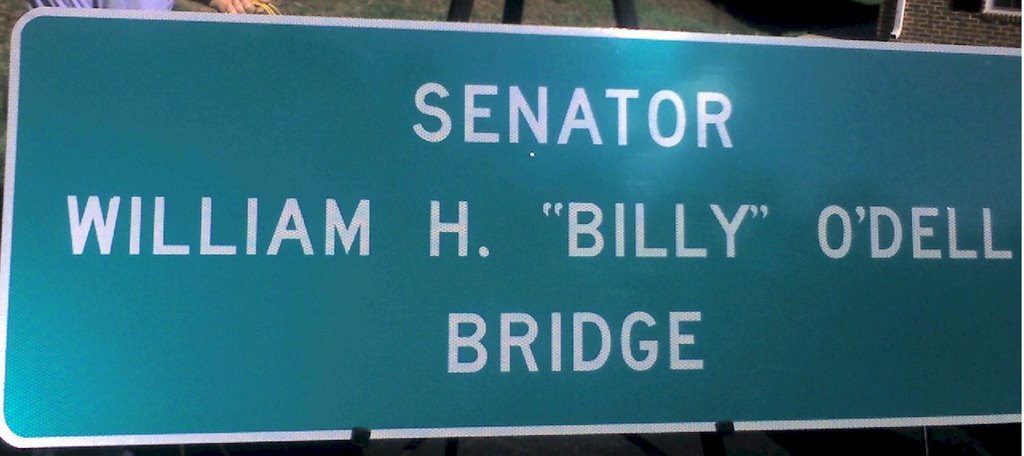Marion Barry: ceremonial vs. real name change of a street
My first reaction to the local NPR story, "Petition calls on DC to rename street after Marion Barry," is that a counter-petition should created to not name a street in DC after former mayor Marion Barry.
DC has two types of street name changes. One is ceremonial, with a sub-name affixed to a stretch of street, while the overarching street name isn't changed, and a full-name change, which is rare for a major arterial but it does happen. For example, in SE DC, Nichols Avenue was renamed many years ago in honor of Martin Luther King Jr. A proposal to rename 16th St. NW in favor of former President Ronald Reagan fortunately died...
Bridge sign in Abbeville County, South Carolina.
I don't favor a renaming of a major arterial for Marion Barry, although I'd be fine with a ceremonial renaming of a bridge--many states including Maryland names bridges in honor of politicians, soldiers killed in the line of duty, etc.
For such a name change, I'd nominate the 11th Street bridges--which connect the city, east and west of the Anacostia River, and Ward 6 to Ward 8--as suitable for renaming in honor of Marion Barry.
Note that I wrote in the COMMERCIAL DISTRICT REVITALIZATION FRAMEWORK PLAN FOR DOWNTOWN CAMBRIDGE, MARYLAND that elected officials need to take their responsibilities as stewards and managers of a community's image very seriously:
Just as the study team believes that “we are all destination managers now,” elected and appointed officials in particular and in association with other community stakeholders serve as a community’s “brand managers”—whether or not they choose to think of their roles in this manner.
That means that decision-making on land use and zoning, business issues, infrastructure development (roads, sewers, water, utilities, transit), technology (broadband Internet, etc.) and quality of place factors (arts, culture, historic preservation and heritage, education, public schools and libraries, etc.) must be consistent and focused on making the right decisions, the decisions that collectively achieve and support the realization of the community’s desired vision and positioning.Something else I read termed this as making "brand deposits" or "brand withdrawals," how the decisions and actions concerning a brand either make positive contributions and build the brand or the actions are negative and diminish the value of the brand, its reputation, aspirational qualities, etc.
I recognize that he did both good and bad things during his tenure, but I would say that a community's brand is very important, and that the city's brand can be tarnished by the renaming of a street, even for a such a prominent personage as Marion Barry, when the record of the person being honored is as checkered.
cf. the Courtland Milloy column, "Marion Barry's eulogy to pay homage to a different side" versus Jonetta Rose Barras, "The death of Marion Barry."
Barras' column comes closer to my thinking when she writes:
In Southern tradition, it is not proper to speak ill of the dead. But to white-wash a life is a disservice to the struggle it witnessed and overcame. It also doesn’t help the living glean critical lessons.To move forward, the city needs to be complete in assessing Marion Barry's legacy. For example, as was done in the Washington Monthly article, "A dream deferred; a black mayor betrays the faith," from July 1986.
So, I have come to bury Barry, not to continue any political packaging. The unvarnished truth is this: He squandered his potential and the public’s trust. What’s more, for many years it was mostly about him: his determination to dominate all facets of the District’s political, civic and business life and to be heralded as the emperor, although in his final days, he was essentially clothesless and powerless.
Labels: electoral politics and influence




3 Comments:
I agree. Given his role with ECTC, in stopping I-95 by Catholic University of America, he played a role in disproportionately routing the freeway traffic through DC's least affluent areas.
we need to rename a street or airport after Barry & reagan at the same time- the Barry-Reagan international airport or barry reagan freeway this way both constituencies would be happy and dancing in the streets
Thank you for providing such a valuable information and thanks for sharing this matter.
Post a Comment
<< Home